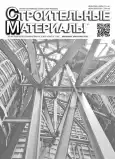Decarbonization of the economy – geophysical meaninglessness and economic disadvantage of combating the greenhouse effect (open source analysis). Part 2. Russia’s climate policy and its impact on the construction industry
- Авторлар: Khozin V.G.1
-
Мекемелер:
- Kazan State University of Architecture and Engineering
- Шығарылым: № 7 (2025)
- Беттер: 50-57
- Бөлім: Статьи
- URL: https://rjsvd.com/0585-430X/article/view/688700
- DOI: https://doi.org/10.31659/0585-430X-2025-837-7-50-57
- ID: 688700
Дәйексөз келтіру
Аннотация
The international agreements, protocols and programs related to global warming, supported by the Russian Federation, as well as plans to combat greenhouse gas emissions, primarily carbon dioxide, recognized as the greenhouse effect main anthropogenic factor, are considered. The article analyzes the Climate Doctrines of the Russian Federation, including the Comprehensive Plan for the Climate Doctrine implementation, federal laws, regulations and a Strategy for long-term development with low greenhouse gas emissions until 2050 in terms of their impact on the construction industry development. The danger of striving to zero CO2 emissions and decarbonization for the construction materials production is shown. A positive example of solving the reducing greenhouse gas emissions problem is presented.
Негізгі сөздер
Толық мәтін
Авторлар туралы
V. Khozin
Kazan State University of Architecture and Engineering
Хат алмасуға жауапты Автор.
Email: khozin.vadim@yandex.ru
Doctor of Sciences (Engeneering), Professor
Ресей, 1, Zelenaya Street, Kazan, 420043Әдебиет тізімі
- Gagarin V.G. Macroeconomic aspects of substantiation of energy-saving measures in improving the thermal protection of building enclosing structures// Stroitel’nye Materialy [Construction Materials]. 2010. No. 3, pp. 8–16. (In Russian). EDN: MSTTQZ
- Efimov V.I. The reality of a carbon footprint in global climate change. Zhizn’ Zemli. 2021. No. 3, pp. 328–335. (In Russian). EDN: YYBRGQ. https://doi.org/10.29003/m2437.0514-7468.2020_43_3/328-335
- Korzun V.A. Izmeneniya klimata: prichiny, prognozy, vozmozhnye posledstviya dlya mirovoj ekonomiki [Climate change: causes, forecasts, possible consequences for the global economy]. Moscow: IMEMO RAS, 2012. 61 p.
- Fedorov B.G. Carbon rent (biota of Russia). Lesohozyajstvennaya informaciya. 2016. No. 3, pp. 86–94. https://sciup.org/karbonnaja-renta-biota-rossii-14336737 (Date of access 18.06.2025). (In Russian). EDN: WMDQSN
- Nazarov V.P., Afinogenov D.A. Global climate change as a threat to national security: American and Russian political practices. Vestnik of the Volga State Technological University. Series 4: History. Regional studies. International relations. 2021. Vol. 26. No. 1, pp. 107–122. (In Russian). EDN: QRKDHB. https://doi.org/10.15688/jvolsu4.2021.1.10
- Fedorov V.M. Political and economic aspects of the green energy transition concept. Energeticheskaya politika. 2022. No. 4, pp. 68–80. (In Russian). EDN: MSSLIP. http://dx.doi.org/10.46920/2409-5516_2022_4170_68
- Rakhimova N.R., Rakhimov R.Z. XVI International Congress on Cement Chemistry “Further decarbonization and circular production and the use of cement and concrete”. Stroitel’nye Materialy [Construction Materials]. 2024. No. 1–2, pp. 95–99. (In Russian). EDN: MDFBCC. https://doi.org/10.31659/0585-430X-2024-821-1-2-95-99
- Khozin V.G., Khokhryakov O.V., Sibgatullin I.R. Karbonatnye cementy nizkoj vodopotrebnosti [Carbonate cements with low water consumption]. Moscow: АSV. 2021. 336 p.
- Bashmakov I.A., Potapova E.N., Borisov K.B., Lebedev O.V., Guseva T.V. Cement sector decarbonization and development of environmental and energy management systems. Stroitel’nye Materialy [Construction Materials]. 2023. No. 9, pp. 4–12. (In Russian). EDN: DVGDSP. https://doi.org/10.31659/0585-430X-2023-817-9-4-12
- Khozin V.G. Decarbonization of the economy – the geophysical meaninglessness and economic disadvantage of combating the greenhouse effect (open source analysis). Part 1. Scientific justification of climate change. Stroitel’nye Materialy [Construction Materials]. 2025. No. 6, pp. 45–53. (In Russian). https://doi.org/10.31659/0585-430X-2025-836-6-45-53
- Rattle I., Gailani A., Taylor P.G. Decarbonization strategies in industry: going beyond clusters. Sustainability Science. 2024. Vol. 19, pp. 105–123. http://dx.doi.org/10.1007/s11625-023-01313-4
- Bashmakov I.A. The scale of the necessary efforts to decarbonize global industry. Fundamental’naya i Prikladnaya Klimatologiya. 2022. Vol. 8. No. 2, pp. 151–174. (In Russian). EDN: ZVDHXM. https://doi.org/10.21513/2410-8758-2022-2-151-174
- Jajal P., Tibrewal K., Mishra T., Venkataraman C. Economic assessment of climate mitigation pathways (2015–2050) for the brick sector in India. Climate Change Signals and Response. 2019, pp. 273–287. http://dx.doi.org/10.1007/978-981-13-0280-0_17
- Zakharov A.I., Smirnov S.I., Cherkasskaya S.V., Guseva T.V. Assessment of ways to reduce the energy and carbon intensity of large-format ceramic stone production. Stroitel’nye Materialy [Construction Materials]. 2024. No. 4, pp. 43–48. (In Russian). EDN: DAVREA. https://doi.org/10.31659/0585-430X-2024-823-4-43-48
- First -neutral brick production line launched in Kortemark. Ceramic World Web. URL: https://ceramicworldweb.com/en/news/wienerberger-first-co2-neutral-brick-production-line-launched-kortemark.
- Production of ceramic products: An information and technical guide to the best available technologies ITS 4-2023. Federal Agency for Technical Regulation and Metrology. Official edition. Moscow: NDT Bureau, 2023. 319 p.
- Lyubomirskiy N.V., Fedorkin S.I., Bakhtin A.S., at al. Konstrukcionnye i teploizolyacionnye stroitel’nye materialy prinuditel’nogo karbonatnogo tverdeniya iz vtorichnogo syr’ya: monografiya [Structural and thermal insulation building materials of forced carbonate hardening from recycled materials: monograph]. Simferopol: ARIAL. 2021. 407 с.
Қосымша файлдар








